Energy Efficiency: End-users, Energy Traders and Other Stakeholders Should be Prepared

László Kenyeres, Partner, Wolf Theiss Budapest (left); Ádám Lukonits, Associate, Wolf Theiss Budapest
Beginning this year, a so-called energy efficiency obligation system (EKR) was introduced in Hungary. It provides excellent opportunities for customers, energy traders, and other stakeholders. However, they should also be aware of some pitfalls that could impact their capacities, plans, and relations with each other.
The EKR system aims to unfold Directive 2012/27/EU on energy efficiency (EED), part of the EU’s Clean Energy Package. The EKR’s core idea is to achieve a certain increase in energy efficiency by natural gas and power traders, universal service providers, and fuel distributors on the side of their end-users. The amount is 0.05% (2021), 0.1% (2022), 0.3% (2023), 0.5% (2024-2027), 0.35% (2028), 0.15% (2029) and 0.05% (2030) of the energy sold to their end-users (in other words, those who purchase energy for final consumption, and not, for example, energy conversion) in the second year before the reference period, respectively.
The affected stakeholders can fulfill their obligations through different ways:
(i) they can implement energy efficiency investments at the level of the end-users (e.g., lightning modernization, thermal insulation, modernization of heating systems, the use of renewable energy sources, installation of solar panels, or car-sharing services);
(ii) they can decide not to make any investments but to pay a contribution of HUF 50,000/GJ of the energy sold to their end-users; or
(iii) they can buy already implemented investments (white certificates) on the secondary market.
For a while it has been clear that the system will pose significant obligations and onerous sanctions on the affected companies. Calculations predicted an aggregate cost of HUF 10 billion for 2021 that will rise to HUF 90 billion by 2024 for the entire market. Therefore, it is important to be familiar with the system, most importantly because it is already in force since the beginning of this year and sets target values for 2021.
The EKR impacts the client-supplier relations, their contracts, and the contract negotiations between them. For example, it is recommended to declare in the energy supply contracts that the investments implemented by the end-user can be used by the supplier to fulfill its obligations under the system. International practices show that the investment costs, the anticipated level of efficiency, the measurement and recording of results, and the settlement between the parties should also be included in the contracts.
The stakeholders and their potential lenders, contractors, and auditors shall also anticipate complex legal structures, including, among other things, the refinement of ESCO contracts, contracts for finance, and contracts for trading with white certificates. (These will be bilateral for a while, given that the centralized market is yet to be established for these certificates.)
However, essential elements are missing from the regulation: the standard catalog of investments is yet to be adopted; the basis of calculating the specific target values for each year is vague; the HEPURA’s platform to keep track of the implemented investments has not yet been established; it is not clear how the complex and/or long-term investments can be documented, audited, and reported; the incentive schemes of the government are yet to be constructed; the detailed rules of reporting, paying, and recording the energy efficiency contribution are still not known; there is no clear concept and regulation for the secondary market of white certificates.
The legislator follows the principle of “learning by doing”; therefore, the experiences of the forthcoming months, and the involvement of up-to-date legal and other professionals providing first-hand information and interpretation, will have great significance. That is especially so given that the Hungarian parliament has the amendment of the EKR system on its agenda for the fall period; the revision of the EED directive is also on the table.
Update: After almost half a year spent full of anticipation, the standard catalog of investments is finally available raising numerous practical and legal questions, including, inter alia, who can review the calculations that are made by using the catalogue, or how can one verify that it used the catalogue properly.
This article was first published in the Budapest Business Journal print issue of September 24, 2021.
SUPPORT THE BUDAPEST BUSINESS JOURNAL
Producing journalism that is worthy of the name is a costly business. For 27 years, the publishers, editors and reporters of the Budapest Business Journal have striven to bring you business news that works, information that you can trust, that is factual, accurate and presented without fear or favor.
Newspaper organizations across the globe have struggled to find a business model that allows them to continue to excel, without compromising their ability to perform. Most recently, some have experimented with the idea of involving their most important stakeholders, their readers.
We would like to offer that same opportunity to our readers. We would like to invite you to help us deliver the quality business journalism you require. Hit our Support the BBJ button and you can choose the how much and how often you send us your contributions.





KOENIGSHOFER%20MICHAEL_3zu4_PRINT-CUT-SMALLER.jpg)
-SMALLER-CUT.jpg)

